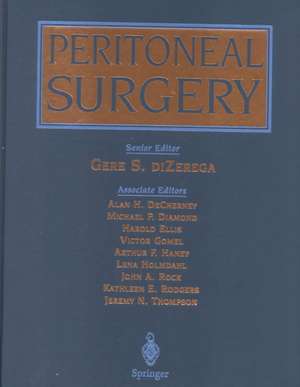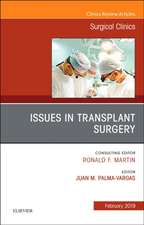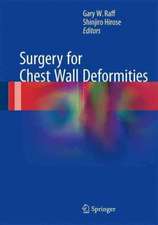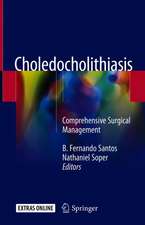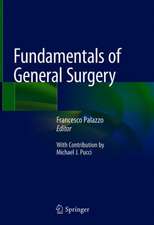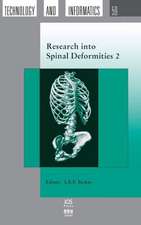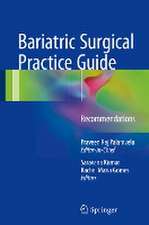Peritoneal Surgery
Cuvânt înainte de V. Gomel Editat de Gere S. diZeregaen Limba Engleză Hardback – 13 oct 1999
| Toate formatele și edițiile | Preț | Express |
|---|---|---|
| Paperback (1) | 1443.71 lei 6-8 săpt. | |
| Springer – 26 noi 2012 | 1443.71 lei 6-8 săpt. | |
| Hardback (1) | 1375.20 lei 38-44 zile | |
| Springer – 13 oct 1999 | 1375.20 lei 38-44 zile |
Preț: 1375.20 lei
Preț vechi: 1447.57 lei
-5% Nou
Puncte Express: 2063
Preț estimativ în valută:
263.15€ • 276.01$ • 219.06£
263.15€ • 276.01$ • 219.06£
Carte tipărită la comandă
Livrare economică 28 martie-03 aprilie
Preluare comenzi: 021 569.72.76
Specificații
ISBN-13: 9780387986104
ISBN-10: 0387986103
Pagini: 532
Ilustrații: XXIII, 532 p.
Dimensiuni: 210 x 279 x 41 mm
Greutate: 1.5 kg
Ediția:2000
Editura: Springer
Colecția Springer
Locul publicării:New York, NY, United States
ISBN-10: 0387986103
Pagini: 532
Ilustrații: XXIII, 532 p.
Dimensiuni: 210 x 279 x 41 mm
Greutate: 1.5 kg
Ediția:2000
Editura: Springer
Colecția Springer
Locul publicării:New York, NY, United States
Public țintă
ResearchDescriere
Peritoneal Surgery addresses the response of the peritoneum to injury and the prevention of post-surgical adhesions resulting from general and gynecologic surgery. Adhesions, or scar tissue binding two normally separate surfaces, form when the peritoneum, the membrane covering the abdominal wall and protecting the inner organs, is damaged during surgery, inflammation, or injury. Negative complications from adhesions include pelvic pain, infertility, intestinal obstruction, multiple surgical complications resulting from surgery to remove or pull them apart, and therefore a greater surgical workload and economic burden to the healthcare system. In this book, experts in the field address peritoneal repair, the role of surgical technique to prevent adhesions, adhesion formation, complications of adhesions, and developing technology in the prevention of adhesions.
Cuprins
Section 1 Peritoneum and Peritoneal Repair.- 1 Peritoneum, Peritoneal Healing, and Adhesion Formation.- 2 Peritoneal Fluid.- 3 Peritoneal Tissue Repair Cells.- 4 The Biology of Peritoneal Tissue Repair.- 5 Cytokine Responses to Peritoneal Inflammation: The Role of the Mesothelium.- 6 The Role of Integrins in Peritoneal Healing.- 7 Proteases and Protease Inhibitors in Tissue Repair.- Section 2 Adhesion Formation.- 8 The Plasmin System, a Marker of the Propensity to Develop Adhesions.- 9 Peritoneal Fibrinolysis and Adhesion Formation.- Section 3 Surgical Technique.- 10 Laparoscopic Myomectomy.- 11 Foreign Materials.- 12 The Peritoneum and Laparoscopy.- 13 Adhesions: Laparoscopy Versus Laparotomy.- 14 Reducing Adhesion Formation in Gynecologic Procedures Using Laparoscopic Surgery.- 15 Role of Sutures and Suturing in the Formation of Postoperative Adhesions.- 16 Pollutants Resulting from Intraabdominal Tissue Combustion.- Section 4 Complications of Postoperative Adhesions.- 17 Incidence of Postsurgical Adhesions.- 18 Classification of Adhesions.- 19 Conventional Radiography and Cross-Sectional Imaging Modalities in the Diagnosis of Adhesions.- 20 Ectopic Pregnancy and Adhesion Formation.- 21 Ovarian Surgery and Laparoscopy.- 22 Peritoneal Endometriosis.- 23 Prognostic Factors of Distal Tubal Occlusion.- 24 Endometriosis, Endometrioma, and the Problem of Adhesions.- 25 Myomectomy and Adhesion Formation.- Section 5 Outcome Measures and Adhesion Formation.- 26 The Magnitude of Adhesion-Related Problems.- 27 Prevalence of Adhesions and the Associated Costs in General Surgery.- 28 Outcome Measures and Adhesion Formation: Pain and Postsurgical Adhesion.- 29 Infertility and Adhesions.- 30 Contributions of Adhesions to the Cost of Healthcare.- 31 Clinical Significance of Adhesions in Patients with Chronic Pelvic Pain.- Section 6 Adhesion Prevention Adjuvants for Clinical Use.- 32 Development and Clinical Evaluation of Intergel Adhesion Prevention Solution for the Reduction of Adhesions Following Peritoneal Cavity Surgery.- 33 Laparoscopic Treatment of Peritoneal Adhesions.- 34 Use of Adhesion Prevention Barriers in Pelvic Reconstructive and Gynecologic Surgery.- 35 Adhesion Prevention: Past the Future.- Section 7 Developing Technology.- 36 Transperitoneal Pharmacokinetics.- 37 Developing Pharmacologic Agents for Adhesion Prevention.- 38 Animal Adhesion Models: Design, Variables, and Relevance.- 39 Adhesion Prevention: The Role of Fibrin Glue.- 40 Bioadhesive Polymers That Reduce Adhesion Formation.- 41 Polymer Solutions and Films as Tissue-Protective and Barrier Adjuvants.
